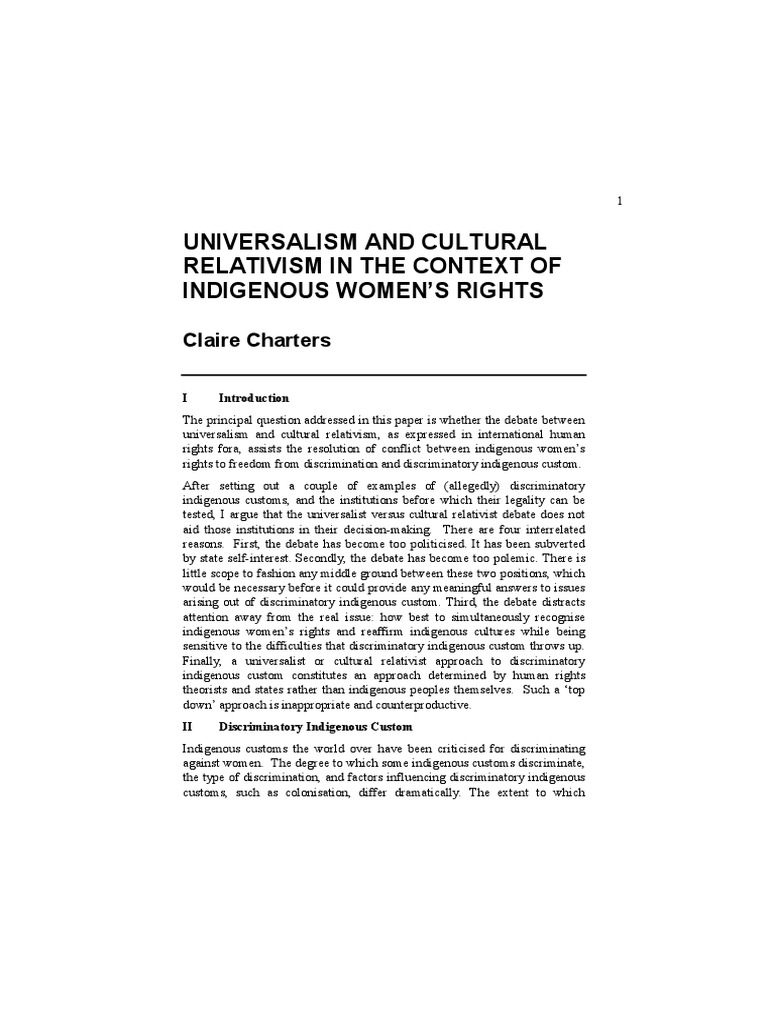Cultural relativism and universalism represent two pivotal paradigms in the discourse surrounding human rights, ethics, and social norms. Both concepts contribute to our understanding of how culture influences the promulgation and interpretation of moral principles, yet they often stand in stark opposition to one another. This discussion delves into these paradigms, their implications, and the nuances that define their relationship within the context of contemporary societal challenges.
Cultural relativism posits that beliefs, values, and practices must be understood in their cultural context. This perspective asserts that there are no universal standards of right and wrong, suggesting that what is deemed ethical in one culture may be viewed as immoral in another. Cultural relativists argue that anthropocentric perspectives, which often originate from a singular cultural lens, fail to encapsulate the richness and diversity of human experiences. This viewpoint aims to foster tolerance and appreciation for cultural differences by advocating for a recognition of the validity of various moral frameworks.
Nevertheless, the adoption of cultural relativism invites numerous complexities, particularly when addressing human rights violations. Critics argue that absolute adherence to cultural relativism can enable oppressive practices under the guise of cultural tradition. For instance, practices such as female genital mutilation or honor killings may be justified by cultural beliefs but are invariably at odds with universal human rights principles. This contention reveals a fundamental tension: how can we respect cultural diversity while simultaneously advocating for basic human rights that transcend cultural barriers?
In contrast, universalism posits that there are fundamental human rights and moral values that are inherent to all individuals, regardless of cultural context. Rooted in the belief that all humans share a collective dignity, universalism promotes the idea that certain rights—such as the right to life, liberty, and personal security—are inalienable and should be upheld universally. This perspective often draws upon international legal frameworks, such as the Universal Declaration of Human Rights, which articulates a comprehensive set of rights applicable to every individual, irrespective of cultural or national differences.
Universalists argue that human rights are not merely Western constructs, as some cultural relativists suggest, but rather reflect a shared understanding of what constitutes a dignified existence. This righteousness is rooted in shared human experiences and aspirations, serving as a counterpoint to the relativist argument that moral judgments are entirely culturally determined. Also, proponents of universalism assert that the enforcement of these rights can catalyze positive cultural shifts, challenging harmful customs while promoting a more humane global society.
Despite their differing philosophies, the discourse between cultural relativism and universalism is not merely binary. Rather, it occupies a continuum that encompasses a multitude of perspectives. Compromise is possible, where a hybrid approach advocates for universal values while simultaneously respecting cultural practices that do not infringe upon individual rights. This nuanced understanding seeks a balance, recognizing the importance of cultural identity while advocating for universal human rights.
Moreover, cultural relativism and universalism have profound implications for global governance, international relations, and humanitarian efforts. In humanitarian interventions, the clash of these philosophies becomes particularly salient. For instance, when international organizations intervene in situations of human rights abuses, the justification often hinges on universalist ideals. However, such interventions can be perceived as neo-colonial overreach, fueling resistance and resentment among local populations who may view these actions as an imposition of foreign values.
Additionally, the tension between these two paradigms is evident in the realm of legal frameworks. National laws may reflect cultural relativism, allowing for practices that contravene international human rights standards. The challenge, therefore, lies in reconciling local customs with global norms. Legal pluralism emerges as a promising solution, wherein multiple legal systems coexist, allowing for flexibility while ensuring the protection of fundamental rights.
Furthermore, the debate extends into the field of education, where cultural relativism and universalism shape curricula and narratives. Educational frameworks grounded in cultural relativism may prioritize local customs and histories, fostering a sense of cultural pride and identity. However, such frameworks risk reinforcing harmful practices if not coupled with an awareness of universal rights. Conversely, an educational approach rooted in universalism can promote global citizenship, encouraging students to engage with diverse cultures while critically examining injustices within their own communities.
The intersection of cultural relativism and universalism is also crucial in the conversation surrounding climate change and environmental justice. Different cultures approach environmental stewardship in unique ways, influenced by their histories, values, and cosmologies. Cultural relativism can provide valuable insights into indigenous knowledge systems and traditional ecological practices that warrant respect and preservation. Nevertheless, the urgency of climate action necessitates a universalist stance that emphasizes collective responsibility and solidarity across cultural divides to combat global environmental degradation effectively.
In summation, the interplay between cultural relativism and universalism is a dynamic and multifaceted discourse that influences various domains of human experience. While cultural relativism promotes the appreciation of diverse cultural identities, it can also inadvertently facilitate the perpetuation of oppression. Universalism, conversely, provides a framework for advocating fundamental human rights but may risk imposing external values. Therefore, a balanced approach, recognizing the validity of both perspectives, is essential for fostering a just and equitable global society. Understanding and navigating this delicate balance is crucial, not only for advocating human rights but also for addressing the multifarious challenges that our world faces today.
